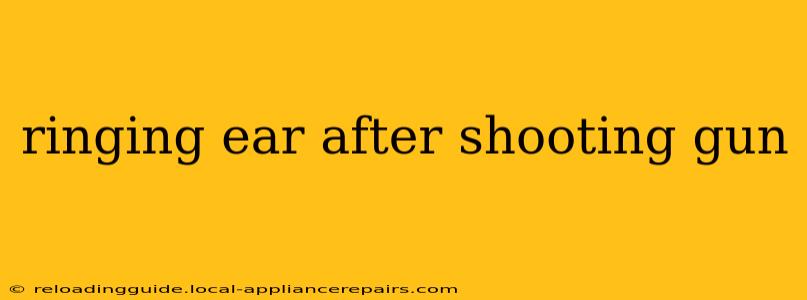Shooting guns, whether for sport, hunting, or self-defense, can expose you to dangerously high levels of noise. While the thrill of the activity is undeniable, the potential for hearing damage is a serious concern. Many shooters experience temporary ringing in the ears, also known as tinnitus, after firing a weapon. Understanding the causes, recognizing the symptoms, and implementing preventative measures are crucial for protecting your hearing health.
What Causes Ringing Ears After Shooting?
The intense sound produced by firearms significantly exceeds safe noise exposure limits. Each shot generates a powerful acoustic impulse that can damage the delicate hair cells within your inner ear. This damage disrupts the normal function of the auditory system, leading to the perception of a ringing, buzzing, hissing, or clicking sound – tinnitus. The severity of the tinnitus and the duration of its presence depend on several factors:
- Type of Firearm: Larger caliber weapons and those with less effective muzzle brakes generally produce louder reports.
- Distance from the Muzzle: Being closer to the firearm significantly increases noise exposure.
- Use of Hearing Protection: The absence of, or inadequate, hearing protection dramatically increases the risk of hearing damage and tinnitus.
- Frequency of Shooting: Repeated exposure to loud gunfire compounds the risk over time.
Types of Hearing Damage from Gunfire
The damage isn't always immediately apparent. Temporary tinnitus is a common sign of noise-induced hearing loss (NIHL), but more severe and permanent hearing loss can also occur. This can manifest as:
- Temporary Threshold Shift (TTS): A temporary decrease in hearing sensitivity, often accompanied by tinnitus. This usually resolves within a few hours or days.
- Permanent Threshold Shift (PTS): Permanent hearing loss resulting from prolonged or intense noise exposure. PTS is irreversible.
- Hyperacusis: Increased sensitivity to everyday sounds.
Recognizing the Symptoms of Noise-Induced Hearing Loss
While ringing in the ears is a prominent symptom, other indicators of NIHL include:
- Muffled hearing: Sounds seem quieter or less clear.
- Difficulty understanding speech: Particularly in noisy environments.
- Pain in the ears: A sharp, aching pain can indicate significant damage.
- Feeling of fullness or pressure in the ears: This can be accompanied by dizziness.
Protecting Your Hearing on the Shooting Range
Preventing noise-induced hearing loss is significantly easier than treating it. The most effective way to protect your hearing while shooting is to consistently utilize proper hearing protection:
- Hearing Protection Devices (HPDs): Choose high-quality earmuffs or earplugs rated for noise reduction rating (NRR) of 22 or higher. Combining earmuffs and earplugs provides even greater protection.
- Proper Fit: Ensure your HPDs fit snugly and comfortably to maximize their effectiveness.
- Consistent Use: Wear your hearing protection during every shooting session, regardless of the firearm or ammunition type.
Seeking Professional Help
If you experience persistent ringing in your ears after shooting, or notice any changes in your hearing, seek immediate medical attention from an audiologist or ENT specialist. Early diagnosis and intervention can help prevent further hearing loss and manage existing symptoms.
Conclusion
Ringing in the ears after shooting is a clear warning sign of potential hearing damage. By understanding the risks and implementing effective hearing protection strategies, you can significantly reduce your chances of experiencing noise-induced hearing loss and preserve your hearing for years to come. Remember, your hearing is invaluable—protect it!

